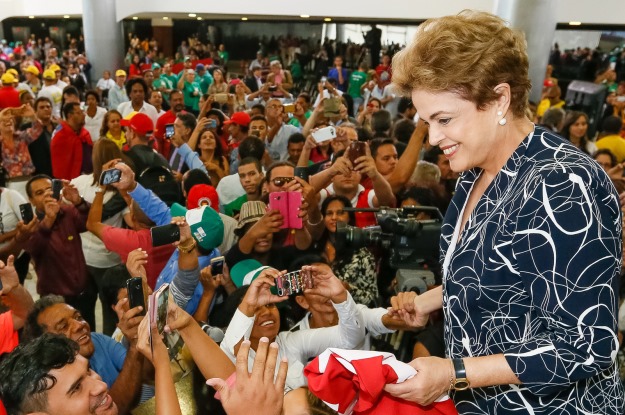When Dilma Rousseff was suspended as Brazil’s president last month, Vice President Michel Temer quickly fired the existing cabinet and installed his own team. Though her presidential portraits were put back on the walls after being briefly removed, the message was still clear: Dilma won’t be coming back.
But could she?
Rousseff’s path back to the presidency is widening amid a series of scandals around the interim government, murmurs of new senators potentially switching their votes against impeachment, and reports that another top businessman implicated in the Lava Jato corruption scandal is close to finalizing a plea bargain that could implicate more top politicians. But it is still a path so narrow that some see a better chance of Brazil converting to a French-style parliamentary system with an appointed prime minister – which itself sounds just short of outlandish.
In short, Rousseff is still widely expected to be impeached by the Senate in late July or August, according to five Brazilian analysts who spoke with AQ. That said, as has become clearer with every unpredictable twist over the past several months, anything is possible in Brazilian politics.
“There’s never a zero percent in politics, and never a 100 percent in politics as well,” said political analyst Thiago de Aragão of Arko Advice in Brasília. “But the chance for her returning at the moment is not more than 10 percent if I had to put a number to it.”
One in 10 is a high enough probability to make it worth exploring what it would take for Rousseff to return to the helm of the world’s fifth-largest country and seventh-largest economy. Impeachment requires the support of at least two-thirds of the Senate, or 54 senators. Considering 55 senators voted to suspend Rousseff on May 12, it would appear that only two senators need to switch sides for impeachment to be rejected.
There are a lot of “howevers.” For one, Senate President Renan Calheiros (PMDB – Alagoas) refrained from voting on the suspension, but he could choose to cast a vote for impeachment and as a leading member of Temer’s party he is considered a sure pro-impeachment vote. Three additional senators absent from the vote – Jader Barbalho (PMDB – Pará), Eduardo Braga (PMDB – Amazonas), and Pedro Chaves (PSC – Mato Grosso do Sul) – are all members of the ruling coalition and considered pro-impeachment votes.
That means at least six senators would need to feel a change of heart about Rousseff. As many as 10 senators who voted to suspend her have since expressed criticism of the interim government and suggested their votes are undecided, with these six frequently mentioned: Cristovam Buarque (PPS – Distrito Federal), Hélio José (PMDB – Distrito Federal), Omar Aziz (PSD – Amazonas), Acir Gurgacz (PDT – Rondônia), Antônio Carlos Valadares (PSB – Sergipe), and former soccer star Romário de Souza Faria (PSB – Rio de Janeiro).
Several have been outspokenly critical of the Temer government in the wake of leaked phone recordings appearing to show Temer’s newly appointed cabinet members working to subvert a corruption investigation, which has forced the ouster of both Planning Minister Romero Jucá (PMDB – Roraima) and Transparency Minister Fabiano Silveira. Romário said Monday that “all these new political facts will be influential.” In an article today, Buarque expressed concern over the “recklessness” and “irresponsibility” of the Temer cabinet and said “the game is not decided” on impeachment.
Such remarks highlight how “the chance has increased over the past two weeks that [the corruption investigation] Lava Jato can do to Temer what it did to Rousseff,” said Ricardo Ribeiro, political analyst at São Paulo-based MCM Consultores. Aside from the leaked wiretapped phone calls, Temer has been hit with protests against his decision to cut the Culture Ministry, which he later reversed, as well as criticism over appointing an entirely white male cabinet.
Local political calculations will also affect senatorial votes, according to analyst Rafael Cortez of São Paulo-based Tendências Consultoria, pointing to how Romário is a potential gubernatorial candidate in 2018 for the state of Rio. “It doesn’t matter if the scenario is against Dilma,” Cortez said, “the point is whether or not their switch will help them to build their political careers when they’re fighting local elections.”
Important to keep in mind is that it makes political sense for any senator to right now express criticism of the interim government’s obvious faults and suggest they will need to be wooed to give their support to impeachment, noted Aragão. “I spoke with several senators over the past week that are heavily criticizing the new administration, but they say that at least now they can have a dialogue,” he said. “Overall, people prefer 100 times over to be under this new government where dialogue is open in contrast to when Dilma was president. Before they were talking to the walls.”
Rousseff believes she has a shot, saying last week in a front-page article for national newspaper Folha de S. Paulo, “We can reverse the situation.” While she took time off from politics last month to visit family and ride a bicycle around the southern city of Porto Alegre, she is still living in Brasília at the Alvorada Palace – official residence of the president – in a reminder that nothing is yet final. Rousseff currently counts base support from 22 senators, including two from the now-governing PMDB – underscoring the vice-president’s loose control over his own party. She has reportedly met with all of them, including Senator Roberto Requião (PMDB – Paraná), who dined with Rousseff last week and later tweeted: “I believe the Senate has realized that the impeachment is screwed up.”
Still, it is hard to make the argument that Rousseff – never known for her charm or tact – could win back enough support without help from Temer further hurting himself. If Temer is directly implicated in Lava Jato, if his cabinet continues to crumble, if he is unable to pass fiscal measures aimed at boosting a struggling economy – all would impact impeachment, according to Juliano Griebeler, a political analyst with Barral M Jorge consultancy in Brasília.
Lurking beneath all this is a completely different scenario under which Rousseff could be removed from the presidency. The Tribunal Superior Eleitoral (TSE), Brazil’s electoral court, has for months been investigating whether her 2014 reelection campaign was funded with illicit money, which would be grounds for cassação, or the judicial revocation of Rousseff’s presidential mandate. Now unclear is if such a ruling would also oust Temer, as there was a similar case in Brazil in which a governor was deemed cassado but his vice-governor was not.
Cortez of Tendências Consultoria puts a 10 percent chance on Rousseff being cassada, a 10 percent chance on her returning to office, and an 80 percent probability of her being impeached. Ribeiro of MCM Consultores puts 90 percent chance on Rousseff being impeached, but an almost zero chance on her returning to the office. He sees a higher likelihood of Congress calling an early election or amending the constitution to convert to a parliamentary system with a prime minister in charge of daily executive affairs and a more ceremonial president.
“The problem is that nobody really believes that Dilma Rousseff will be able to run the country,” Ribeiro said. “She gave all of them enough proof that she will not be able to govern Brazil.”
That feeling may well be held by much of Rousseff’s own Workers’ Party (PT). Given her troubles as president, and the PT’s ability to now play gadfly to the ruling government as it takes the heat for the country’s economic troubles, in the opposition may well be where most PT members prefer to stay.
“The PT is now more comfortable in the opposition than when it was the president’s party under Dilma,” said Octavio Amorim Neto, a political science professor at the Getulio Vargas Foundation in Rio de Janeiro. “Although the PT leaders publicly state they want Dilma back into the presidential palace, they actually prefer that she will finally be impeached.”
—
Kurczy is a special correspondent for AQ.








